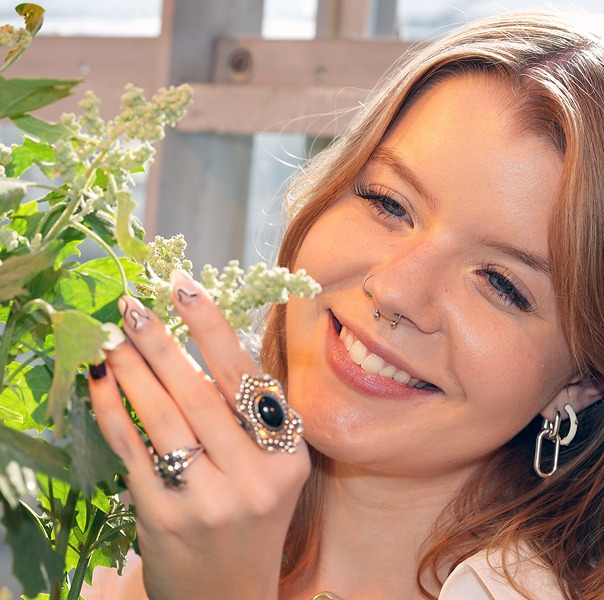Claire King named a Golden Opportunity Scholar
As we move towards making more seats at the table, we have to make it understood that we're not taking any away.”
- Claire King, senior in plant genetics, breeding and biotechnology
It’s easy to imagine the whole of agriculture as a giant feast sprawled out on an equally giant table. America’s famous Thanksgiving feast—the plump turkey roasted until golden, the warm, spiced smell of sweet potato casserole, the spongy cornbread dressing that you swirl around on your plate to soak up the juice left behind from the collard greens—is built around the harvest after all. And, Claire King, a senior in Purdue’s plant genetics, breeding and biotechnology major in the Department of Agronomy, understands that sustaining all this food requires making sure more people have a voice in creating it.
King, who goes by she/they pronouns, was recently named a Golden Opportunity Scholar by the American Society of Agronomy, Crop Science Society of America and the Soil Science Society of America. The honor gives her membership to all three societies, professional mentorship and funding to attend the annual tri-society meeting and the Congressional Visits Day in Washington D.C. The award has also given her time to reflect on the opportunities in her life and the opportunities offered to others.
King was born into the small town of Osawatomie, Kansas, surrounded by corn and soybean fields. Their first neighbors were farmers. They got involved in Future Farmers of America in school, and her mother’s work as a pastor when they moved to Waco, Texas, often addressed food insecurity.
“I've always had food on my plate,” King shared. “But I've known people in my life who never know where their food comes from. So I'm a huge advocate of understanding why farmers do what they do and finding ways we can work together.”
That hunger to bring people closer to their food brought King to Purdue in 2020, where the remote schedule of classes allowed them ample time for research opportunities. She worked in Ronald Turco’s soil microbiology lab and Mitch Tuinstra’s sorghum genetics lab, where she gained insight in how to perform experiments and took on an independent research project to search for mutations in fragrant sorghum.
 They also assisted in teaching two undergraduate courses and earned summer internships at Bayer and Corteva where they got to hone their plant breeding skills: pollinating corn, contributing towards the hybridization of wheat and applying hyperspectral imaging to phenotype plants. King now works with Cankui Zhang, an associate professor of agronomy who studies crop molecular physiology, and she is helping create a procedure to genetically transform quinoa. She already has an internship lined up for next summer at Corteva.
They also assisted in teaching two undergraduate courses and earned summer internships at Bayer and Corteva where they got to hone their plant breeding skills: pollinating corn, contributing towards the hybridization of wheat and applying hyperspectral imaging to phenotype plants. King now works with Cankui Zhang, an associate professor of agronomy who studies crop molecular physiology, and she is helping create a procedure to genetically transform quinoa. She already has an internship lined up for next summer at Corteva.
Adding four internships and several research experiences to their resume may seem daunting to most students, but King said these are chances for her to try new things.“I really see internships as a way to do something that I would not be able to do at academia at my current education level.”
Her open-mindedness to new opportunities goes hand-in-hand with how she views the future of agriculture. King sees hope in the diversification in both the crops we grow and in the agricultural industries themselves.
King has seen first-hand the growth that diversity brings in her Phi Mu sorority as the Panhellenic Chair of Diversity, Equity and Inclusion. “My time as the DEI chair has enhanced my understanding of food insecurity. It helped me relate more with my major because I learned there's all these factors that somebody cannot control that can put them at a disadvantage. I want to bridge that gap so we can all share the same playing field.”
King believes that opening conversations with underrepresented groups like black and indigenous farmers and women is the key to feeding the world. Bringing lost and new voices to agriculture will bring more golden opportunities to everyone at the table.
To King, the incorporation of new plants and people is just as important as holding respect for tradition. “I’m not a typical agronomy student with farm experience, and my peers and faculty have welcomed me with open arms anyways. Their living and understanding of life is just as valuable as mine, and it’s important to how agriculture is run and how successful it has been in America. Diversity isn’t exclusionary—it includes them, too. And, we will all benefit from having open conversations and learning from each other.”







